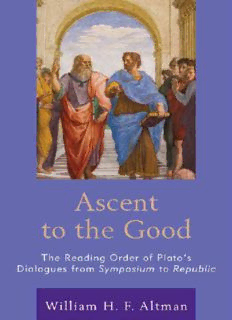
Ascent to the Good: The Reading Order of Plato’s Dialogues from Symposium to Republic PDF
Preview Ascent to the Good: The Reading Order of Plato’s Dialogues from Symposium to Republic
Ascent to the Good Ascent to the Good The Reading Order of Plato’s Dialogues from Symposium to Republic William H. F. Altman LEXINGTON BOOKS Lanham • Boulder • New York • London Published by Lexington Books An imprint of The Rowman & Littlefield Publishing Group, Inc. 4501 Forbes Boulevard, Suite 200, Lanham, Maryland 20706 www.rowman.com 6 Tinworth Street, London SE11 5AL, United Kingdom Copyright © 2018 The Rowman & Littlefield Publishing Group, Inc. All rights reserved. No part of this book may be reproduced in any form or by any electronic or mechanical means, including information storage and retrieval systems, without written permission from the publisher, except by a reviewer who may quote passages in a review. British Library Cataloguing in Publication Information Available Library of Congress Cataloging-in-Publication Data Names: Altman, William H. F., 1955- author. Title: Ascent to the good : the reading order of Plato’s dialogues from Symposium to Republic / William H. F. Altman. Description: Lanham : Lexington Books, 2018. | Includes bibliographical references and index. Identifiers: LCCN 2018040301 (print) | LCCN 2018047313 (ebook) | ISBN 9781498574624 (Electronic) | ISBN 9781498574617 (cloth : alk. paper) Subjects: LCSH: Plato. Dialogues. Classification: LCC B395 (ebook) | LCC B395 .A549 2018 (print) | DDC 184—dc23 LC record available at https://lccn.loc.gov/2018040301 ∞ ™ The paper used in this publication meets the minimum requirements of American National Standard for Information Sciences—Permanence of Paper for Printed Library Materials, ANSI/NISO Z39.48-1992. Printed in the United States of America in memoriam Gregory Vlastos (1907–1991) A scholar and a gentleman who was kind to me Socrates: “Very well,” I said: “since we have reached this point, my boys, let us take heed not to be deceived [ἐπειδὴ ἐνταῦθα ἥκομεν, ὦ παῖδες, πρόσσχωμεν τὸν νοῦν μὴ ἐξαπατηθῶμεν].” Lysis 219b5–6 Socrates: Still, if we are going to do this, for my part I think it is necessary for all of us to be competitive in relation to knowing the truth, what it is [τὸ ἀληθὲς τί ἐστιν] concerning the things of which we are speaking, and what is false; for it is a common good to all for this to become clear. I will go through with the argument as it seems to me to be, but if to any of you I seem to be confirming to myself things that aren’t so, it is necessary to take me to task and to refute [ἐλέγχειν] me. Gorgias 505e3–506a3 Cleitophon: Making an end of it, Socrates, I finally asked you yourself about these things as well, and to me you said of justice that it is to harm one’s enemies and help one’s friends. But later, the just man seemed to never harm anyone but to do all things for the benefit of all [πάντα γὰρ ἐπ᾽ ὠφελίᾳ πάντας δρᾶν]. Cleitophon 410a7–b3 Contents Acknowledgements xi Abbreviations xiii Preface: Ascent to the Good xv Introduction: Aristotle and Plato xxxix 1 Lysis-Euthydemus: Mental Gymnastics and ἔρως after Symposium 1 §1. The Good and the Beautiful in Plato’s Symposium 1 §2. Systematic Socratism 26 §3. Plato’s Deliberate Use of Fallacy in Lysis-Euthydemus 53 §4. The Play of Character and the Argument of the Action 92 2 Laches and Charmides: Fighting for Athens 119 §5. Between Euthydemus and Meno 119 §6. Socratism and the Knowledge of Good and Bad 143 §7. The Return to Athens in Laches and Charmides 183 3 Plato and Gorgias: Socrates’ Touchstone 213 §8. From Gorgias to Republic 213 §9. Plato’s Confession 234 §10. Gorgias and the Shorter Way 270 §11. Protagoras Revisited 300 §12. Gorgias and the Longer Way 328 ix
Description: